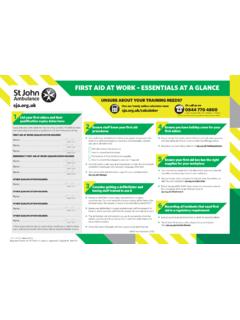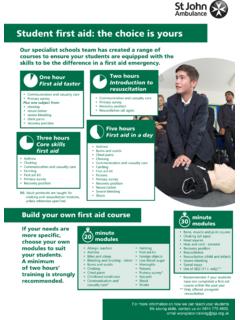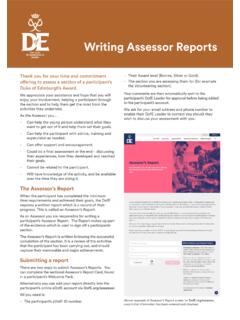Transcription of First aid self-teach workbook - St John Ambulance
1 1 First aid self - teach workbook Participant name: eDofE ID: DofE level: Start date: 2 The duke of edinburgh s Award (DofE) and St John Ambulance A workbook for using First aid from St John Ambulance for your DofE skill section. Thank you for choosing the very important skill of First aid for your DofE award. St John Ambulance teaches people First aid so they can be the difference between life and death and that includes you. By choosing to learn First aid you are not only developing a new talent but you will also boost your self -esteem, develop practical and social skills and learn how to set and rise to a challenge. If this isn t enough, it should also be good fun too! The DofE First aid self - teach workbook will give you everything you need to learn lifesaving skills at your own pace as part of your DofE award.
2 You will find suggested activities, worksheets and case studies in this workbook which will enable you to put together your own personalised schedule of activity, to help meet the aim(s) of your DofE section. Timescales Each activity should last on average one hour per week for the minimum times suggested below. This pack is specifically designed for the Bronze award, lasting three months, however this can be extended to meet the below timelines for the Silver and Gold awards . Level Minimum time Notes Bronze 3 to 6 months You need to do one of your Volunteering, Physical or Skills sections for six months, the others for three. Silver 6 to 12 months You need to do either the Physical or Skills section for six months, the other for three.
3 If you haven t achieved your Bronze award you must extend your Volunteering or the longer of your Physical or Skills sections to 12 months. Gold 6 to 18 months You need to do either the Physical or Skills section for 12 months, the other for six. If you haven t achieved your Silver award you must extend your Volunteering or the longer of your Physical or Skills sections to 18 months. I will be learning First aid for the skills section of my DofE award for _____ months. 3 Choosing your Assessor Just like every section of your DofE award you will need to enlist the help of an Assessor for this section. The Assessor s role is to check and assess what you are doing for an activity. They should be a skilled, qualified or experienced person on the topic of First aid.
4 For example, you may ask a St John Ambulance volunteer or anyone who holds a valid First aid certificate, such as a teacher, youth leader or a health care professional (such as a paramedic, nurse or Doctor). It is important you share your completed workbook with your Assessor when you have finished the section. My Assessor is: _____ Assessor s guidance notes Thank you for your time and commitment in offering to assess the Skills section of this participant s DofE programme. For this section of their DofE programme, the participant has to show development of practical, social or personal skills over a set period of time: First aid encompasses all of this. The participant will need to regularly learn and practice First aid, averaging at least one hour per week.
5 In your role you will help the participant in the following ways: Help them set some goals and understand what they want to get out of learning First aid. Act as a subject matter expert in First aid by providing advice, supervision, feedback and training as needed. This could be virtually such as looking through answers on a First aid worksheet or face to face such as showing the correct technique for the recovery position. Review all of the work the participant completes including case studies, worksheets, quizzes, posters, etc. Support and encourage the participant while they are learning a new skill. Monitor progress. Do a final assessment at the end which should include the practical demonstration of a First aid skill such as treating a major bleed.
6 Participants meet the DofE requirements if they have undertaken their activity regularly, averaging at least one hour per week, over the agreed timescales and have demonstrated effort, perseverance and improvement. Once they have completed this you should produce an Assessor s report. What you write will celebrate the achievement of the participant and will form part of their permanent record of their DofE programme. With this in mind please make your comments personal, positive and engaging. Remember to include the activity start and end dates. To enter your report online, visit and follow the instructions. You will need the participant s name, their eDofE ID number, their DofE level and the section you are assessing.
7 For more information and support please speak to your DofE Leader or contact 4 Activity The following table provides a programme for a three month DofE Skills section. The programme you develop should be relevant and appropriate to you and can include many other different activities, providing your programme averages at least one hour per week. Remember, First aid is a practical skill so the more you physically practice these skills and techniques the better. Completing a First aid course is highly recommended to ensure you can have supervision from an expert in First aid who can check your skills. As you go through the programme ensure you are gathering evidence to upload into eDofE. For example, you could upload photos of you: practicing treating a patient; photos of completed worksheets; write ups of what you have learnt; or certificates etc.
8 Week 1 Coping in an emergency Keeping safe, emergency calls, communication and casualty care Week 2 Primary survey and management of an unresponsive casualty DR ABC and recovery position Week 3 Introduction to resuscitation Cardiopulmonary resuscitation (CPR) & Automated External Defibrillator (AED) Week 4 Minor injuries, bleeding and shock Minor and severe bleeds, abrasions, blisters, splinters and shock Week 5 Bites, stings and allergic reactions Bites and stings and recognition and management of an allergic reaction Week 6 Bone, muscle and joint injuries Fractures, sprains and strains Week 7 Burns and scalds Different types of burns and management of a casualty who has burns or scalds Week 8 Extremes of temperature Understanding exposure to high and low temperatures Week 9 Foreign objects and poisons Exposure to poisons and incidences of foreign objects Week 10 Head injuries and spinal injury Spinal and head injury Week 11 Airway emergencies Asthma and choking Week 12 Chest pain Heart attack and angina attack Week 13 Case studies 5 Keeping safe, emergency calls, communication and casualty care 1 Fill in the gaps using the following words (each may be used more than once).
9 Help response injured dangers yourself bystanders accident casualty information emergency aid assess If you come across an emergency situation when someone has had an _____ or has been _____, as a First aider you must quickly _____ the situation. It is very important to find out what has happened. You must make sure that you remove any _____ to the _____, any _____ or to _____. Never rush straight in to help, as you may make the situation worse if you do not realise the _____. For example, many people panic when they see an accident, run straight into the road and get themselves _____ by a passing car. Once you are sure that there is no further danger, you should check the _____ from the casualty to decide if they are responsive or not.
10 The appropriate _____ should then be applied. Once you have gathered all the _____ you need, get _____. 2 Unscramble the words to find out how to cope in an emergency: sasses het oatniistu: _____ kaem eht aera esaf: _____ geiv egeenyrmc ida: _____ teg lphe fmor sheotr: _____ Week 1 - Coping in an emergency 6 3 Using each of the actions in part 2, explain what you would do in the situation shown below. _____ _____ 7 4 Imagine that you are a bystander, and you are also a First aider. What would you say to each of the other people in the picture? Person 1: _____ _____ Person 2: _____ _____ Person 3: _____ _____ Person 4: _____ _____ Person 5: _____ _____ 8 5 Why is it important to communicate well in an emergency situation?







